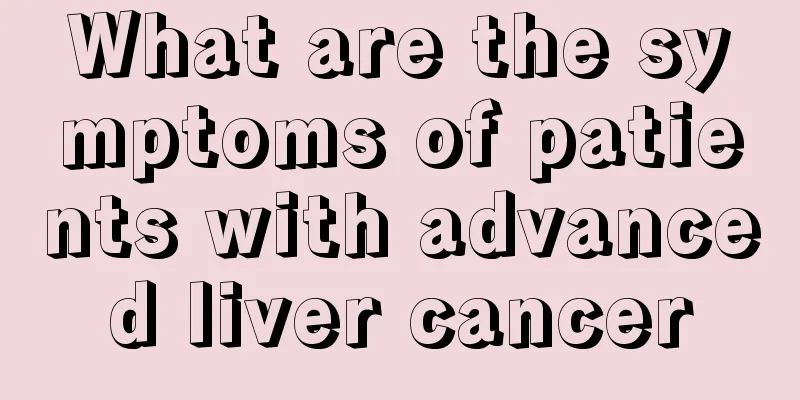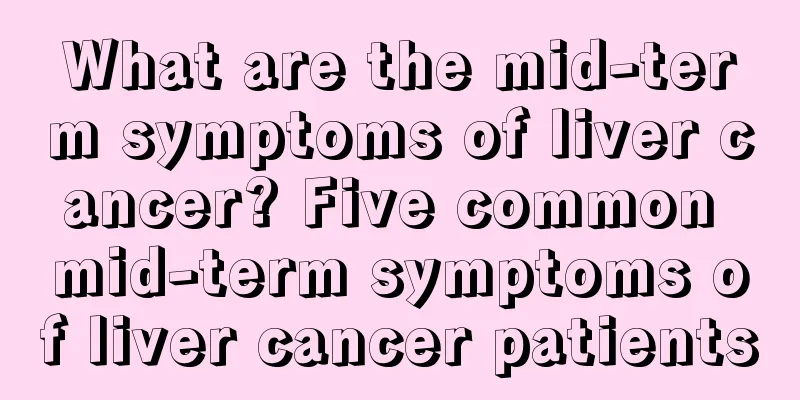What are the symptoms of patients with advanced liver cancer

|
The onset of liver cancer is relatively hidden. Early liver cancer generally has no symptoms. When patients show obvious clinical symptoms, the disease is often in the middle or late stage. The symptoms of mid-stage liver cancer are between the early and late stages, and generally there are no obvious symptoms. Patients who have symptoms and seek medical treatment on their own are mostly in the middle or late stage, often with symptoms such as pain in the liver area, loss of appetite, fatigue, weight loss and liver enlargement. So we summarize the symptoms of mid- and late-stage liver cancer for everyone: Weight loss and fatigue Liver cancer can cause liver damage, decreased digestion and absorption, and reduced food intake. In addition, the products of tumor metabolism can cause changes in the body's biochemical metabolism, leading to weight loss and fatigue, and the degree of weight loss can worsen. In severe cases, cachexia may also occur. Gastrointestinal symptoms In liver cancer, the liver functions poorly, resulting in increased pressure in the portal vein system and digestive tract dysfunction. The enlarged tumor may compress or involve the stomach, which may lead to digestive tract symptoms such as loss of appetite, upper abdominal fullness after meals, or even nausea, vomiting, and diarrhea. Bleeding In liver cancer, liver function is damaged and coagulation function is abnormal, so bleeding tendencies such as bleeding gums, nose bleeding, gastrointestinal bleeding, and subcutaneous ecchymosis are common. Pain in the liver area Pain in the liver area is also one of the common symptoms of liver cancer patients. The pain is often more obvious at night. At the beginning, it is mostly intermittent or continuous dull pain or stabbing pain. It may be mild or severe or relieve itself within a period of time, or even disappear. It is mostly located in the right rib or under the xiphoid process, but it can also radiate to other parts and cause discomfort in other parts. For example, the pain of the tumor at the top of the diaphragm of the right lobe of the liver can radiate to the right shoulder or right back; the tumor in the left lobe of the liver will cause distension and pain in the upper abdomen earlier. In addition to the above-mentioned symptoms of mid- and late-stage liver cancer, most liver cancers are complicated by liver cirrhosis, so mid- and late-stage liver cancers are generally accompanied by symptoms of chronic liver disease, such as chronic liver disease face, liver palms, spider hemorrhoids, hepatosplenomegaly, lower limb edema, jaundice, etc. If you have any questions about liver cancer, you can go to a regular hospital for consultation and treatment, or call the online consultation hotline or online consultation experts. Experts on related diseases are ready to answer your questions in detail at any time. Liver cancer http://www..com.cn/zhongliu/ga/ |
<<: Why is the survival time of liver cancer short?
>>: How to prevent bladder cancer
Recommend
Face becomes tighter after running for one month
Female friends love beauty the most, especially s...
What is the chance of curing bone cancer
What is the chance of bone cancer being cured? Ma...
What medicine is good for throat cancer
What medicine is good for throat cancer? The best...
What to do if you get angry and have bad breath after staying up late
If someone we are communicating with has bad brea...
How to quickly reduce swelling of swollen and painful gums
Teeth are a tool we use to chew food. The food we...
What are the alkaline drinks? 5 recommended alkaline drinks
Alkaline beverages can balance the body's aci...
What are the symptoms of mid- to late-stage nasopharyngeal carcinoma and how long can one live?
What are the symptoms of mid- to late-stage nasop...
How to scrape the belly
With the improvement of living standards, compute...
Kidney Yin deficiency low fever
A weak body will give viruses the opportunity to ...
What is the reason for black stool and how to treat it
Black stool is a situation that people often enco...
What is the analysis method for the results of six blood lipid tests?
When people reach old age, they often develop som...
How to get rid of body odor
Many people don’t know how to get rid of body odo...
How to make pillow core
If you want to make the pillow core yourself at h...
Corn Allergy Symptoms
Many people with allergies have different allerge...
Can tongue cancer be cured in the early stages?
Patients with tongue cancer need to maintain a po...









